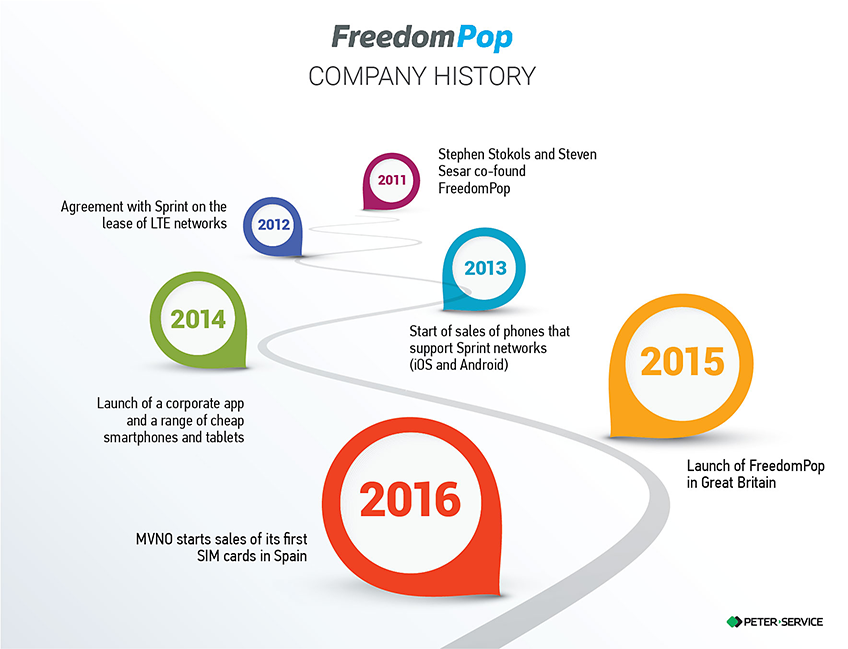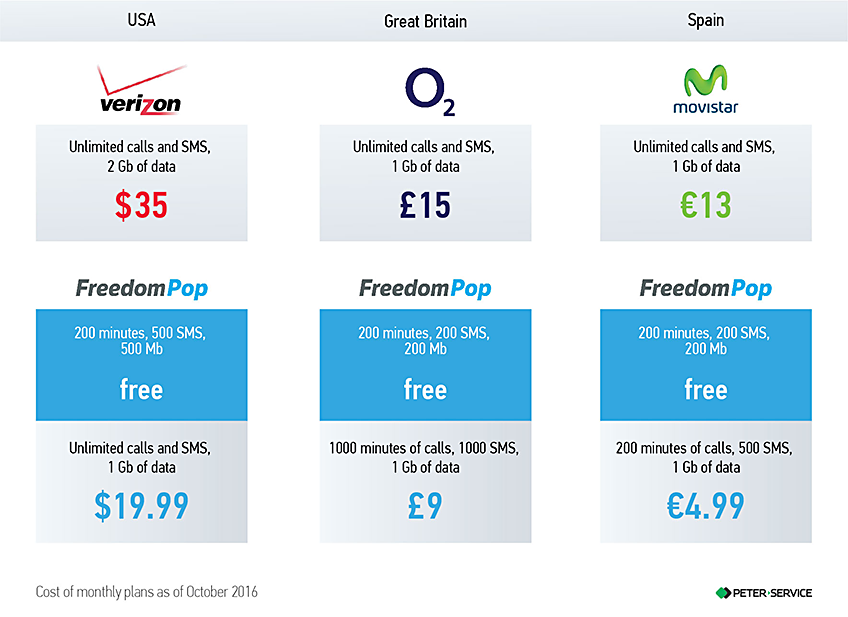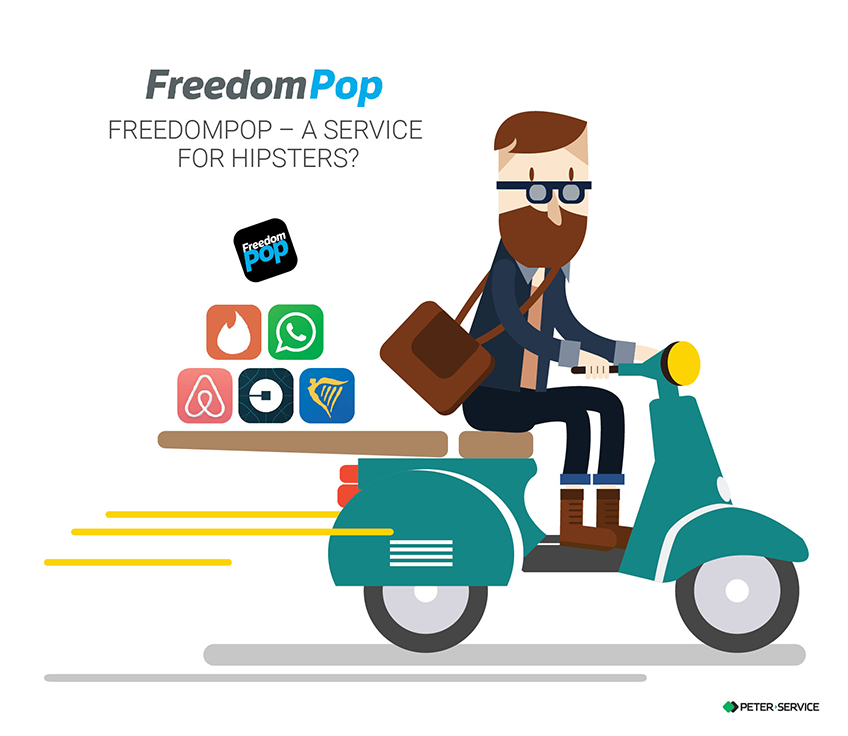FreedomPop – a free mobile operator
Internet, calls and messages without payment. Is this real?
Free Internet, calls and SMS is a way too luring offer, isn't it? FreedomPop, an American operator, was the first to offer subscribers a freemium model unheard of in the Telecom market. The company provides customers a free service package: they pay only for what comes on top of it. We tried to figure out what the "free" connectivity is really worth? Can such a strategy successful in Telecom? What other operators are ready to stop charging for traditional services?
"The Internet is a right, not a privilege"
One day an American entrepreneur Stephen Sokols decided that mobile communication costs too much. "The Internet must be a right, not a privilege", – such was the mission statement of FreedomPop, the first MVNO using a freemium model, that entered the market in 2011.
The startup offered customers free access to SMS, mobile network, fixed and wireless internet, with a limit set on the volume of basic services. As an MNO, the operator opted for the network of Sprint, a telco, and used the GSM/CDMA standard for Internet access. A year later FreedomPop enhanced its presence heading off to Europe and starting the expansion from Great Britain and Spain.

The company is pursuing an ambitious plan to become a TOP-10 operator in the world in the next 5 to 10 years. The investors are already enthusiastic about FreedomPop. In 2013, the MVNO received 30 million dollars from sponsors. In 2016, LetterOne, an investment business of Mikhail Fridman, invested 50 million dollars in the startup to support its expansion. Earlier, the Russian businessman made an investment in Uber, a popular taxi ordering service working in 500 cities, with a pricing policy that blew up the traditional taxi market.
In total, various companies invested over 100 million dollars in FreedomPop. For now, the telecom startup is operating in the US, Great Britain and Spain, but Stephen Sokols has set a far-reaching goal to extend the service to Russia, South-East Asia, India, Bangladesh, Mexico, Singapore, Brazil, and South Africa.

How much is the "free" connectivity?
The basic free mobile rate plan of FreedomPop in the US includes 500 SMS, 200 minutes of calls and 500 Mb LTE high-speed Internet traffic every month. In Spain, subscribers get 300 free messages, 100 minutes and 200 Mb of data. In Great Britain, they get 200 messages, 200 minutes and 200 Mb.
This traffic is fairly sufficient for accessing Facebook and e-mail, order a pizza through a mobile app and regularly chat with your friends via WhatsApp. But for daily Internet usage watching video and listening to music, you will need more data. And you will have to pay for all traffic on top of the defined limit.
The operator also offers traditional paid services at cheaper rates than local market players. Is this a cheap offer indeed? Let's compare:

More freedom: what else is not free?
Along with cheap plans, FreedomPop offers unlimited calls and SMS inside the network, free inbound calls from 60 countries, a possibility to get a virtual number from anywhere in the world, as well as special promos such as "Refer a friend and get free 4G traffic as a gift".
Another difference of Freedom Pop from traditional mobile operators is that it avoids contractual commitments popular in the USA and Europe. In Western countries major telcos are known to offer their customers a contract to buy a phone with a SIM card. With this, the subscriber commits to paying a fixed amount every month, both for the basic rate plan and the new smartphone.
As a rule, by purchasing a phone with a deferred payment, the customer gets an expensive rate plan bundled to it, and in the long run pays a premium for a "cheap" gadget. Moreover, he cannot switch operator before the contract expires. FreedomPop does not make binding agreements giving its customers the right to refuse its services at any moment.
FreedomPop, a low cost provider?
Low cost leisure, tickets and taxis – now it is also connectivity which is "low cost".
The virtual operator FreedomPop can become a global low cost provider in the mobile connectivity market. For a basic payment (which is zero at FreedomPop), the customer gets a limited number of services and pays extra for additional services.
Discounter passenger airlines use the same model: a customer will get from point A to point B, but will be left without lunch and travel with no luggage. With a FreedomPop SIM card, a customer will get through to a neighboring state, but will not be able to get quality service from the support desk, he will spend some time to set up his phone and struggle with the mobile app.
This is what real FreedomPop subscribers say on Facebook:
Of course, FreedomPop is cheaper, but it is not worth the money in the long-term. There are no sales offices. The support is horrible: one hour after my query I received a voice message that my request will be replied in 24 to 48 hours. I want my money back!"
"I ordered a phone and it arrived only in 5 weeks. The phone came with no settings made, I spent hours to figure out how to connect the SIM card. Google Voice does not work."
"I waited on-hold for the Support for 15 minutes, with no answer at all. This is how I spend my 200 minutes trying to reach the Service Tea".
"The Android app is crippled. Connection is always lost, even with a strong Wi-Fi signal at my place".
Similar to any low cost provider, FreedomPop offers a freedom of choice to potential clients. You are free to pay more and get a high-quality service. Yet, the very idea of such a service makes many minor things unimportant, as so far there are no similar alternatives to FreedomPop around.

FreedomPop – a new OTT service?
The business model of the virtual operator FreedomPop completely transforms the perception of traditional communication services and, in many ways, resembles the idea of traditional OTT services. And here is why...
Around the globe, operators are facing losses from mobile apps transferring data. Analysts of J’son & Partners Consulting say that in 2014 the estimated losses of Russian companies from OTT services were 15 to 20 billion rubles, or 2 percent of the annual revenues. Globally, operators lost more than 14 billion dollars. FreedomPop was one of the first to focus its business model on the emerging market conditions instead of confronting them.
Actually, FreedomPop founders claim that their project is the same as OTT because its services are tailored to MNOs of various operators, utilize their infrastructure and are free or shareware.
It is indeed impossible to provide calls and Internet access without agreements with MNOs, yet this is the responsibility of FreedomPop, while subscribers can feel they are really using "pure" OTTs like Facebook, WhatsApp and Telegram.

At the same time, FreedomPop does not intend to challenge other OTTs – on the contrary, it seeks advancing itself using their popularity. In August 2016, FreedomPop issued a SIM card enabling customers to send WhatsApp messages in 30 countries free of charge! This means that even in roaming there is no need to pay for the traffic inside this popular messenger. For instance, in Spain where FreedomPop has been operating since 2016, 90 percent of messages are sent exactly through this service.
Earlier, the idea of unlimited WhatsApp messaging has been utilized by other foreign operators, e.g. Nextel in Brazil and MTV Mobile in Switzerland, and in Russia a similar service was launched by Yota in summer 2016. Roaming subscribers of this Russian MVNO with a zero balance on their numbers can text for free in popular messengers such as WhatsApp, Viber, Facebook Messenger, iMessage, and Telegram. The service is automatically activated when there is no more money left on the account, and it does not require additional tweaks and connections.
With all that, FreedomPop is going to move forward. It made another step towards the OTT business model by launching its own free app for Android and iOS. It works via Wi-Fi networks and can switch to cell networks as well, offering the possibility to make calls and send messages.

FreedomPop – a service for hipsters?
Generally, MVNOs are not considered an interesting business by venture capitalists. The OTT focus safeguards a certain innovative dimension for FreedomPop. But investors have other reasons to believe in this service.
The trick here is the potential audience. FreedomPop perfectly fits with the life-style of the creative class, or hipsters, millennials, also called the Y generation. The life-style of hipsters promotes a new type of philosophy: "Cheap does not mean poor quality. Cheap things can be trendy". This new framework of values formed a broad range of services for the creative class which thinks it inappropriate to overpay for anything other than stylish clothes, new gadgets and good burgers. Ten-euro air tickets from popular low cost airlines, Uber and Gettaxi instead of traditional taxi providers, rented apartments from Airbnb to replace costly hotels, mobile apps for any life purpose – new services appear everyday steadily replacing established offerings.
The philosophy of the FreedomPop brand fully meets the demands of the target audience forming a new consumer pattern, including in communication services. Connectivity can be cheap. And cheap can be modern.

Free mobile connectivity in Russia. Is this real?
In November 2013, Evgeny Gordeyev, a Russian investor, announced the launch of Atlas, a free operator using the Light MVNO model.
In June 2016, the App Store featured the Atlas App (also available for Android). No SIM cards or rate plans, whatsoever. You simply download the app and "join the game". For half a year, Atlas has been working as a loyalty for-points program for paying mobile connectivity services. After installing the app, the user received 100 atlases on his account. He received 75 points more for confirming his phone number. To begin using free mobile service, users needed to collect 999 atlases and transfer them to their phone accounts.
How to collect points? By referring friends, shaking the Atlas Tree, completing missions from the Treasure Box and taking part in promotions, e.g. by ordering a clean-up service for your apartment or hotel room via partner apps.
In October 2016, they started selling hard SIM cards in Moscow, and, further, this virtual operator will appear in St. Petersburg, Kazan, Ekaterinburg and other cities. The tariff range of the new virtual operator includes packages from 50 Mb to 5 Gb of data. Each month customers get one package for free and can activate other packages using internal points, or atlases. With no sufficient atlases, packages can be bought for real money.

While Evgeny Gordeyev takes the freemium path, Andrey Dubovskov, CEO, MTS, voices even more disruptive thoughts.
"Russian operators should not charge subscribers for calls, SMS and data transfer. These services can become free pretty soon. Operators will make profits on partnerships with other companies and advertising", said Andrey Dubovskov in an interview cited by the Vedomosti in June 2016.
Free mobile communication may become real. It is hard to believe this for now. Similarly, in early 2000s it was hard to imagine free mobile calls, unlimited texting in messengers and cheap mobile Internet in every smartphone. Anyway, unconventional startups such as FreedomPop and Atlas boost competition and open new opportunities for "brick-and-mortar" operators to develop their business. As for the choice, it will always be up to subscribers.
Stay connected!